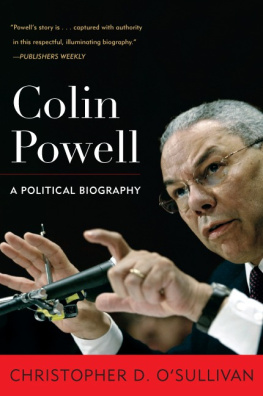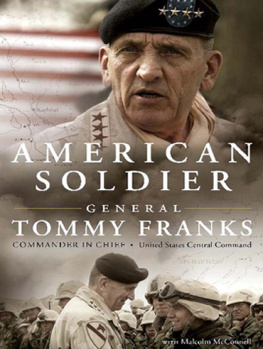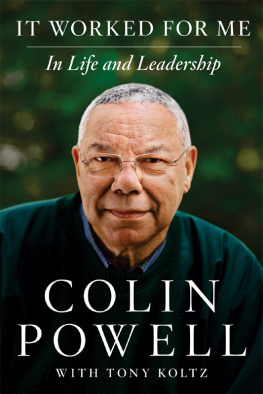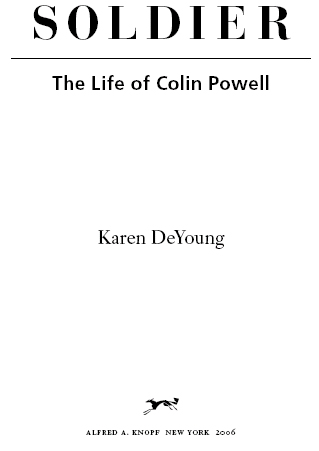
CONTENTS
For my wonderful father,
Bill DeYoung
I will never not be a soldier.
Colin L. Powell
A t precisely 5 p.m. on September 19, 2005, students and faculty bustling along the shaded sidewalks of the National War College stopped and stood at silent attention as the notes from a solitary bugle drifted by on a late-summer breeze. The crisp cadences of the ceremonial Retreat, signaling the official end of the day, were a quotidian reminder that this bucolic campus beside the Potomac River in Washington, D.C. was no ordinary seat of higher learning. Located inside a military installation, Fort Lesley J. McNair, it was surrounded by high redbrick walls and protected by armed guards at every gate.
Despite its bellicose name, the War College had been established at the end of World War II as an institution devoted as much to the avoidance of war as to its practice. Its students were drawn from among the most promising midlevel officers in the armed forces but also from the Department of State, in recognition of diplomacys critical role in keeping the nation secure. Warriors and diplomats studied side by side, learning about each other and from the great strategists in both their fields.
On this warm September evening, the college was celebrating its sixtieth anniversary with a speech by its most distinguished graduate, retired general and former Secretary of State Colin Luther Powell. As the last bugle note sounded, those on their way to Powells 5:30 address resumed their journey toward Roosevelt Hall, an imposing, neoclassical administration and classroom building on the waterfront.
The summer of 2005 was also an anniversary for Powell himself. It marked exactly thirty years since he had arrived on campus as a thirty-eight-year-old lieutenant colonel in the Army Infantry. At the time, the New York Cityborn son of Jamaican immigrants was already well on his way to a brilliant career, with two tours in Vietnam, a stint in the Pentagon and a prestigious White House fellowship under his belt. If he fulfilled the promise that more senior officers saw in him, he could expect to retire after thirty-five years of service with two or more generals stars on his shoulders. He would be one of only a handful of black officers to have risen to such heights.
Powell ultimately soared beyond even his own dreams, becoming national security adviser to one president and chairman of the Joint Chiefs of Staff, the militarys highest office, under two more. He brought the U.S. military through the end of the Cold War and guided it to victory in the Persian Gulf War in 1991. By the time he retired from the Army in 1993, he was a national icon of wise leadershipthe most trusted man in America, according to opinion pollsand his face and inspiring life story were known throughout the world.
When President-elect George W. Bush selected Powell as his secretary of state in December 2000, it was hailed as a stroke of genius. With Powell as the nations most senior Cabinet officer and fourth in the line of succession to the presidency, Americas foreign policy would be in good hands. For Powell himself, it was the culmination of a lifetime of achievement, the seamless melding of soldier and statesman that the National War College had been established to create.
Since leaving the State Department in January 2005 after Bushs election to a second term, Powell had traveled the lecture circuit making paid speeches on leadership and U.S. foreign policy to corporate boards and industry conventions. He never spoke about the specific circumstances of his resignation as secretary of state except to say, when asked, that Cabinet reshuffles were normal at the end of a four-year mandate and his departure had been a mutual decision between him and the president. He artfully brushed aside inquiries about the many published accounts of deep ideological schisms that had rent Bushs national security team and the private humiliations he had reportedly endured at the hands of powerful colleagues.
Audiences often asked about his public role in promoting and defending what many considered to be the most ill-advised act of Bushs presidency: the March 2003 invasion of Iraq. Powell had thrown his considerable personal and professional reputation behind the administrations charges that Iraq possessed chemical, biological and perhaps even nuclear weapons and posed an imminent threat to the United States. In a crucial speech to the United Nations Security Council six weeks before the invasion was launched, he had convinced many skeptical Americans that the threat posed by Iraqi dictator Saddam Hussein was real.
But the war had gone sour almost from the moment U.S. troops rolled triumphantly into Baghdad two months later. A full-blown insurgency had erupted against the occupation forces, Iraq had become a killing field for American soldiers and after two and a half years there was still no end in sight. Powells credibility had been seriously undermined when the threatening weapons he cited as the main justification for invasion turned out not to exist.
No one in his legions of admirers wanted to believe that Powell had been duped by the White Houseor, worse yet, that he had knowingly betrayed the nations trust. Many assumed that he had privately argued against such a clearly misguided adventure and been overruled. But if that was the case, why had such a proud and accomplished man continued to lend the administration his wisdom and expertisenot to mention his credibility?
In fact, Powell had never advised against the Iraq invasion, although he had warned Bush of the difficulties and counseled patience. But the larger mystery of his tenure as secretary of state remained. For four years, over Iraq and a host of other foreign policy issues, he had found himself entrenched in regular combat with conservative ideologuesincluding the vice president and the secretary of defense. Though he had scored some victories, the rumored humiliations had been real. He had been purposely cut out of major foreign policy decisions more than once, and his advice had often gone unheeded or been only grudgingly accepted by the president. Why hadnt he resigned?
The easy answer had the virtue of truth: soldiers didnt quit when they disagreed with the decisions of their commanders. The fact that he had been out of uniform since 1993 was irrelevant to Powell; he would be a soldier until he drew his last breath. But there were other, less easily explained reasons, tangled up in the complicated human core where a mans deepest beliefs about himself and the world around him reside.
After four long years, Powell had anticipated the end of his service and sometimes even longed for it. He had never directly told the president but thought he had made clear to him during the summer of 2004 that he did not intend to stay beyond the next presidential inauguration on January 20, 2005. But when the end of his tenure came, and because of the way it came, his satisfaction at having done his duty was tinged with anger and disappointment.
As the November 2 election approached, gossip and media speculation about a potential second Bush term centered on the likelihood of Cabinet changes. With Iraq in chaos, some thought that Defense Secretary Donald Rumsfeld was a leading candidate for departure. Others were doubtfulgetting rid of Rumsfeld meant acknowledging that mistakes had been made.
Many thought the president might ask the secretary of state to reenlist, at least temporarily. Powell was still the most popular member of his team, far more popular than the president himself. Moreover, a number of foreign policy balls were in the air: the Palestinian-Israeli peace process, which Powell had shepherded for years, was at a critical juncture, and crucial elections for an interim Iraqi government were scheduled for the end of January. Senior Powell aides, long aware of his determination to leave, had recently become convinced that the secretary anticipated an invitation to stay. They were equally certain that he intended to accept, especially if Rumsfeld would be gone.
Next page








